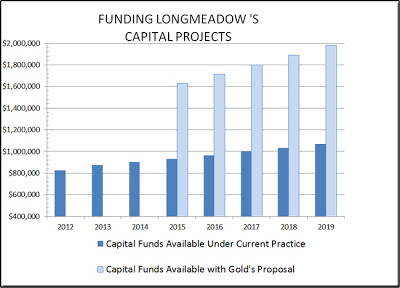A large contingent of town voters came to this town meeting for one vote only- Article 6, to increase the School Department's FY2014 budget by $353,000. (If you doubt that this was the case, watch the end of the video clip below to see 40-50% of the meeting attendees leave after this vote.)
Background Information
Prior to the town meeting there had been many discussions between the SB and the SC regarding the level of FY2014 funding for the Longmeadow School Department. The FY2014 budget guideline established by the SB for all town departments including the School Department was for a 0% increase vs. the current FY2013 budget.
All town departments except the School Department submitted budgets with 0% increases. The SC approved an increase of $706K citing significant effects on Longmeadow education if they were forced to accept a 0% increase. A compromise budget increase of $353K developed by a joint SC/SB committee failed to gain approval by the full SB.
SC members + a large contingent of pro-school advocates rallied their forces and showed up at the May 7 ATM in order to move forward an amendment to increase the SB recommended FY14 School Dept. budget.
Article #6 involved the FY2014 budget and was an important article on the 2013 ATM warrant. In the video clip below showing key portions of the ATM (courtesy of LCTV) you will see three different amendments proposed for Article #6.
- Addition of $353K as recommended by the joint SB/SC compromise committee and supported by the SC (proposed by Michael Clark, chairman of the Longmeadow School Committee)
- Addition of $706K to the FY14 school dept budget (proposed by Jessica Hutchins, town meeting member)
- Addition of $2.5 million to the FY14 school dept budget (proposed by David Gustafson, town meeting member)
Mr. Gustafson's secondary amendment to Article #6 was obviously done to highlight the potential jeopardy of the process for town meeting members to make proposals without due diligence. SB Vice-Chair Mark Gold also pointed out that approval of amendment #2 (increase by $706K) would be an irresponsible action by the Town Meeting without having identified funding sources first and could lead to some dire consequences with other portions of the town budget.
I believe that if SC Chair Michael Clark had not pushed back on the need for the $706K amendment, town meeting members would have approved it.
In the end, the School Dept budget for FY14 was increased by $353K.
I believe that if SC Chair Michael Clark had not pushed back on the need for the $706K amendment, town meeting members would have approved it.
In the end, the School Dept budget for FY14 was increased by $353K.
Bottom line:
Now that this pro-school special interest group has been successful, it may be emboldened to do more. Don't be surprised to see another attempt to increase school funding at a future town meeting- particularly a fall town meeting when fewer people are in attendance.
Voters looking to see that there is balanced spending of their tax dollars between schools and everything else better paid heed to what is happening at town meetings. Better still, they should attend them rather than watching the meetings on LCTV.
Voters looking to see that there is balanced spending of their tax dollars between schools and everything else better paid heed to what is happening at town meetings. Better still, they should attend them rather than watching the meetings on LCTV.






